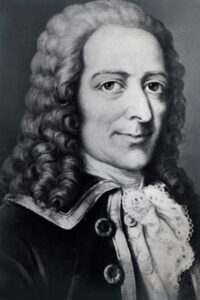
Candide
In the country of Westphalia, in the castle of the noblest Baron of Thunder-ten-trench, lived a youth whom Nature had endowed with a sweet disposition. His face was the actual index of his mind. He had a solid judgment joined to the most unaffected simplicity; hence, I presume he had his name of Candide. The old servants of the house suspected him to have been the son of the Baron’s sister, by a perfect sort of a gentleman of the neighbourhood, whom that young lady refused to marry because he could produce no more than three and eleven quarterings in his arms; the rest of the genealogical tree belonging to the family having been lost through the injuries of time.
The Baron was one of the most powerful lords in Westphalia, for his castle had a gate and even windows, and his great hall was hung with a tapestry. He used to hunt with his mastiffs and spaniels instead of greyhounds; his groom served him as huntsman, and the parson of the parish officiated as his grand almoner. He was called “My Lord” by all his people, and he never told a story, but everyone laughed at it. My Lady Baroness, who weighed three hundred and fifty pounds, consequently was a person of no minor consideration. Then, she did the honours of the house with a dignity that commanded universal respect. Her daughter was about seventeen years of age, fresh-coloured, comely, plump, and desirable.
The Baron’s son seemed to be a youth in every respect worthy of the father he sprung from. Pangloss, the preceptor, was the oracle of the family, and little Candide listened to his instructions with all the simplicity natural to his age and disposition. Master Pangloss taught the metaphysico-theologo-cosmolonigology. He could prove to admiration that there is no effect without a cause and that in this best of all possible worlds, the Baron’s castle was the most magnificent of all castles and My Lady, the best of all possible baronesses.
Read or download Book
Voltaire
François-Marie Arouet (21 November 1694 – 30 May 1778), known by his nom de plume M. de Voltaire, was a French Enlightenment writer, philosopher (philosophe), satirist, and historian.
Biography.
Famous for his wit and his criticism of Christianity (especially of the Roman Catholic Church) and slavery, Voltaire was an advocate of freedom of speech, freedom of religion, and separation of church and state. Voltaire was a versatile and prolific writer, producing works in almost every literary form, including plays, poems, novels, essays, histories, and scientific expositions.
He wrote more than 20,000 letters and 2,000 books and pamphlets. Voltaire was one of the first authors to become renowned and commercially successful internationally. He was an outspoken advocate of civil liberties and was at constant risk from the strict censorship laws of the Catholic French monarchy. His polemics witheringly satirized intolerance, religious dogma, and the French institutions of his day. His best-known work and magnum opus, Candide, is a novella that comments on, criticizes, and ridicules many events, thinkers, and philosophies of his time, most notably Gottfried Leibniz and his belief that our world is the “best of all possible worlds”. François-Marie Arouet was born in Paris, the youngest of the five children of François Arouet, a lawyer who was a minor treasury official, and his wife, Marie Marguerite Daumard, whose family was on the lowest rank of the French nobility.
Some speculation surrounds Voltaire’s date of birth because he claimed he was born on 20 February 1694 as the illegitimate son of a nobleman, Guérin de Rochebrune or Roquebrune. Two of his older brothers—Armand-François and Robert—died in infancy, and his surviving brother Armand and sister Marguerite-Catherine were nine and seven years older, respectively. Nicknamed “Zozo” by his family, Voltaire was baptized on 22 November 1694, with François de Castagnère, abbé de Châteauneuf, and Marie Daumard, the wife of his mother’s cousin, standing as godparents. The Jesuits educated him at the Collège Louis-le-Grand (1704–1711), where he was taught Latin, theology, and rhetoric. Later in life, he became fluent in Italian, Spanish, and English.






